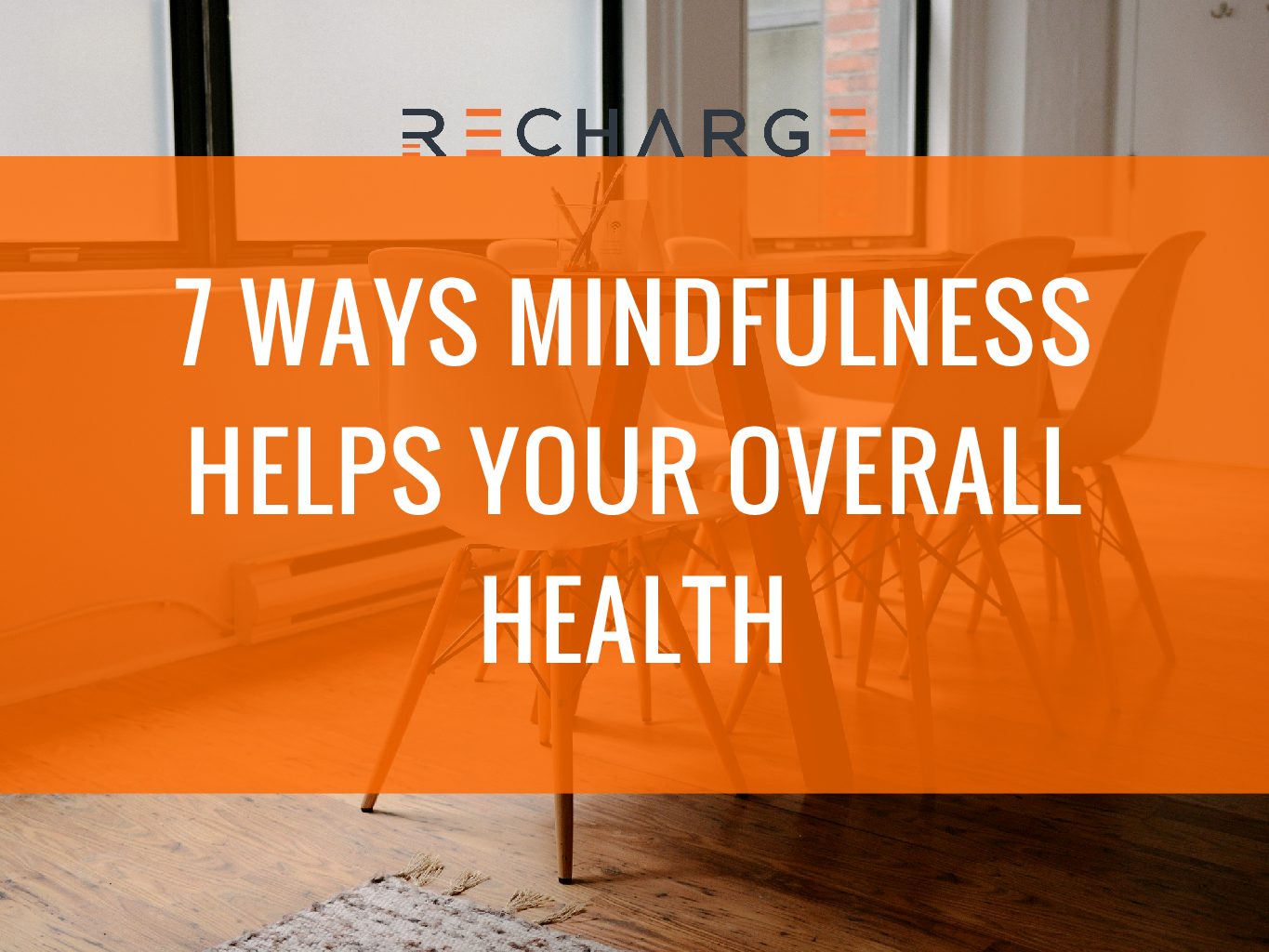Are you in control of your thoughts?
Mindfulness is starting to gain ground as a mainstream topic. The practice of mindfulness is something that continually shows positive overall health outcomes in research. Mindfulness practice is being rapidly applied throughout people’s lives. At Recharge we understand the impact a mindfulness practice can have for individuals, which is why we do our best to incorporate subtly into everything we do.
Below are seven benefits mindfulness practice can have on your overall health…
1. How many to-do lists do you create? Whether mental or physical ones there is always this incessant drive that we need to be constantly checking off boxes throughout our day and throughout our life. Often times this gets applied to our fitness as well.
Moving, physical activity, exercise becomes not an enjoyable event but rather a task to be checked off. A monotonous necessity to maintain health.
Mindfulness acknowledges that notion but asks you–Why? Why am I here?
It allows you to demand a certain level of focus on the task at hand and enjoy it for what it is. A movement, an activity, that you may have once enjoyed or look forward to enjoying.
2. It is no mystery that a great deal of society feels judged by how their body looks, feels, moves. Although we cannot control how others perceive our body, it is fully within our capability to understand our own view of ours.
A practice of mindfulness allows you to be accepting of how you are or in understanding that there is a way you would like to look and you are capable of achieving that in a manner that builds you up as a person, not break you down.
3. Some call it choking under pressure, some call it nerves, whatever phrase you use to describe the phenomenon of looking at an obstacle and freezing at the moment you wish to overcome it, it can hold our minds hostage.
Some may feel this at times of looking at performance records (PR’s), some may feel this when looking at a heavy weight they have not lifted before, others may feel it when they are looking at that box that are asked to jump up onto.
A practice of mindfulness can help you when you reach that obstacle to understand, accept, and acknowledge that feeling.
To understand that this is how you feel goes a long way into taking steps to overcome that.
4. A part of mindfulness practice is the focus on breathing. Although you do it every second of every day (more accurately referred to as ventilation), a focus on this otherwise automatic process can lead to a host of beneficial effects.
In particular it may help with the feeling of relaxation through a conscious effort of breathing by both drawing attention away from your mind running through the day but also to be able to feel the areas of tightness in your body and “breathe into them.”
Breathe into them meaning that we are able to consciously draw attention to those areas and allow breathing to help us relax into positions that decrease that feeling of tightness.
5. Are you a good multi-tasker?
Allegedly, we all are now that we live in a time that benefits from a vast amount of technology and information. However, this has also led us to have a difficulty focusing on one task and providing it all our attention and thought.
Think of conversations with people when your mind wanders, or when you are listening to a lecture while simultaneously tweeting, instagramming, or Facebooking only to realize you actually didn’t listen to the lecture, you merely heard it.
A mindfulness practice provides a set time period for you to be able to draw attention to one task and essentially allows that ability to grow much like a muscle does.
This translates well to when you are looking to get the most out of a workout by keeping attention on the task at hand, how it feels, and how your body is responding instead of what your instagram post of your dinner is going to look like.
6. The embodiment of trauma is not a new concept but has been poorly understood.
The embodiment of emotion may be a bit more relatable. When you are angry, your body posture may be significantly different than when you are sad. We do know however that the influence goes both ways, your body posture can affect how you feel and vice versa.
The awareness of this though, is often lost on many.
Our ability to embody how we feel and understand how our body feels is lost over time for many reasons. Yet a simple and great solution to it is the practice of mindfulness.
Mindfulness allows you to look at yourself and process where your body “tends to store emotion.” As well as why you feel and embody that in the first place.
In other words, storing emotion meanings, how you feel in your body reflective of emotions of thought, memory, or previous experience.
7. The most essential asset to both fitness and health that a mindfulness practice provides however is that of the body scan. The body scan can be vital for all the reasons listed above as it incorporates bits of each into a systematic way that allows you to accept how you and your body feel at any point of the day.
This allows you to do a literal scan of each region of your body, acknowledging where you may have tension or pain. By accepting that those are there you learn to become more comfortable with the uncomfortable–to be more understanding of why this or that may hurt.
Most importantly, to be accepting of the ability of your body to fluctuate and change based on what you do with it and in turn how that reflects on your health, mindset, and fitness.

RECHARGE: Modern Health and Fitness
Email: hey@rechargexfit.com





